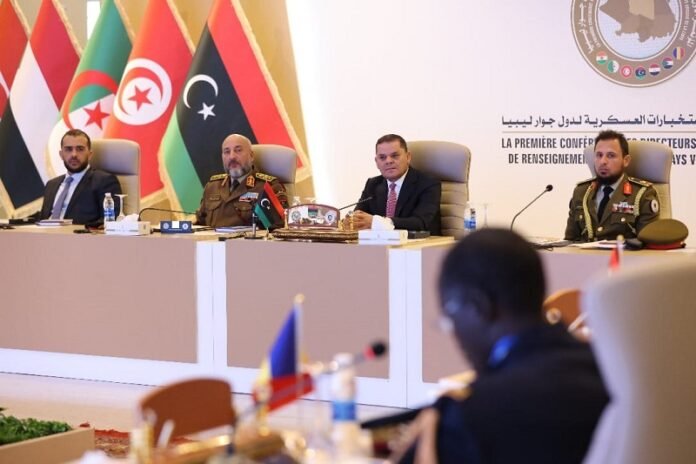In a move that sparked controversy and raised many questions, the Libyan capital, Tripoli, hosted a meeting of military intelligence leaders from neighboring countries.
During the meeting, Brigadier Mahrez Jeribi, the central director of Algerian army security, made provocative statements against Morocco’s territorial integrity, describing the southern provinces as the “last colony in Africa.”
The presence of the Prime Minister of the Government of National Unity, Abdel Hamid Dbeibah, and his reaction to these statements raised numerous questions about Libya’s future stance on the Moroccan Sahara issue and its relations with Morocco.
Libya as a Platform for Algerian Propaganda
The Algerian official’s statements coincided with reports of a private meeting between him and Dbeibah on the sidelines of the conference, where they discussed “Moroccan movements in Libya and the region.” These developments followed Morocco’s hosting of a consultative meeting between Libya’s House of Representatives and High Council of State, a step that resulted in political understandings rejected by Dbeibah’s government on the grounds of a lack of coordination with it.
The question arises: Does this Algerian bias signify a shift in Libya’s position or merely a political maneuver by a government facing internal and external pressures?
Historical Ties and Morocco’s Pivotal Role
Moroccan-Libyan relations have been relatively stable over the years, with Morocco providing vital support for peace in Libya, including hosting political agreements such as the Bouznika dialogues, which fostered consensus among Libyan factions. These initiatives have solidified Rabat’s role as an impartial and influential mediator in regional issues.
With this escalation, the question remains: Can relations between Rabat and Tripoli withstand Algeria’s efforts to undermine Maghreb unity?
Algerian Attempts and Their Inevitable Failure
Algeria’s statements are not new but part of a systematic policy of hostility toward Morocco’s territorial integrity. Nonetheless, these efforts remain limited in impact. Morocco, which has strengthened its international position through growing recognition of its sovereignty over its southern provinces, enjoys strong support from international powers like the United States and many African nations.
Does Dbeibah realize that using this issue against Morocco could make him a party to a conflict serving an Algerian agenda that does not align with Libya’s interests?
Implications for the Regional Scene
- Maghreb Tensions: This stance may deepen divisions among Maghreb countries, hindering economic and political cooperation projects.
- Impact on Libyan Legitimacy: Dbeibah’s government faces internal challenges, and this move may invite criticism over its ability to balance relations with regional partners.
- Morocco’s Future Role: Despite provocations, Morocco appears focused on its role as a stabilizing force in the region, which could bolster its international and regional standing.
Conclusion: Bias or Maneuvering?
Libya’s recent moves toward Algeria remain ambiguous—whether they represent a temporary political maneuver or a strategic alignment placing Tripoli in indirect confrontation with Rabat. What is certain is that Morocco, with its political and diplomatic weight, can overcome these attempts and reinforce its gains regarding the Sahara issue.
Will Dbeibah reconsider this step, or will he persist in a risky policy that could deepen his regional isolation?


